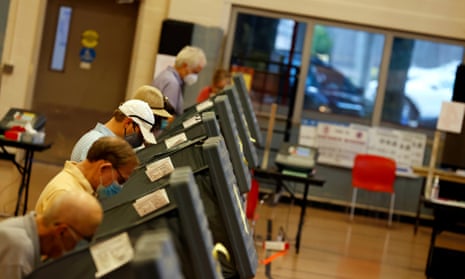Republican lawmakers in Texas are targeting Houston, the state’s largest city and Democratic stronghold, with a series of bills that would limit local authority to administer elections and give that power to the state.
House Republicans on Tuesday gave final approval to two bills, both already passed by the senate in April, that would affect elections in Harris county, the third most populous county in the country. One bill, SB 1750, would get rid of the election administrator position in the county, eliminating a non-partisan role, and give their authority to the county clerk and tax assessor-collector. Another, SB 1933, could give the Texas secretary of state, currently a Republican appointed by Greg Abbott, the governor, administrative oversight of a county office administering elections.
It allows the secretary of state to investigate election “irregularities” if prompted by a complaint and allows them to remove a county election official if the secretary of state has “good cause to believe that a recurring pattern of problems with election administration or voter registration exists in the county”. Problems might include delays in reporting election results, failure to comply with list maintenance procedures and issues with voting equipment.
The house amended the second bill this week to apply only to counties with more than 4 million people, which is currently just Harris county. Changes must be approved by the senate before the bill can head to Abbott’s desk and become law.
Harris county is home to nearly 5 million people, a population that’s more than 20% Black and 44% Latino, according to census data.
The county attorney, Christian Menefee, said that Republican legislators’ latest effort targeting Harris county is part of a trend of them trying to make it more difficult to vote and to administer elections and to subvert local control. He pointed out that currently, all three local officials being targeted – the county election administrator, clerk and assessor-collector, are Black.
“It’s a very clear effort to supplant local control, to demonize people, to make it more difficult for them to do their job, to score political points and give red meat to their base,” he said. “I think they’re going to escalate this every cycle and it’s shameful because the Republican party used to be the party of local control.”
He said the county is planning to file a lawsuit. “We’ll see how successful we are and how it shakes out in the courts,” he said. “When you’re elected by people to protect communities, to protect public officials as the civil lawyer for the largest county in the state, it’s my job to use every single tool in my toolbox to fight back against these laws.”
State senator Paul Bettencourt, a Republican who represents Houston and who authored both bills, said election problems in Harris county in 2022 prompted him to introduce the legislation. About 20 Harris county polling locations ran out of paper on election day in 2022 and some GOP officials said the ballot shortages targeted Republicans. But that claim has been debunked.
Daniel Griffith, senior policy director at the non-partisan organization Secure Democracy USA, said a small group of lawmakers had taken innocuous, unintentional mistakes and administrative issues – which happen during every election across the country – and tried to turn them into a baseless conspiracy that warrants election integrity legislation.
“The evidence underpinning this desire for drastic change seems pretty limited,” he said. “I think the kind of things we saw in Harris county – there’s been reporting that it’s been overblown.”
after newsletter promotion
Another bill this session which did not advance out of committee, SB 1993, would have given the secretary of state the authority to order a new election under certain circumstances in counties with a population of more than 2.7 million. Only Harris county would currently qualify. A separate bill would have ended country-wide voting in Harris county, which allows people to vote on election day anywhere in the county.
“That’s a big deal when you have a county this big with this many people,” Menefee said.
Over the last few years, the GOP-controlled legislature has also ended drive-through voting and 24-hour voting – both efforts introduced by Harris county during the coronavirus pandemic in order to increase voter turnout.
Also on Tuesday, the House passed SB 1070, which would let Texas leave the Electronic Registration Information Center, known as Eric, and contract with a not-yet-determined vendor. A growing number of GOP-controlled states have left the organization in the past year after false conspiracy theories circulated about its ties to the liberal donor George Soros.
If signed into law, SB 1750 would take effect on 1 September. Houston is scheduled to have a mayoral election in November, and advocates and Democratic lawmakers said they were concerned that a handover of election duties so shortly before an election could cause chaos.
